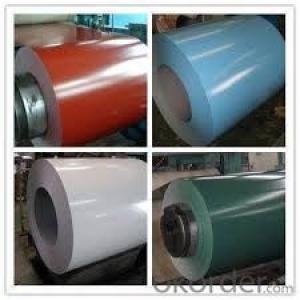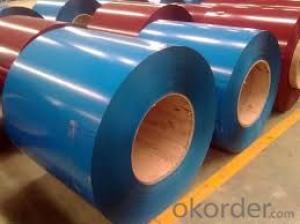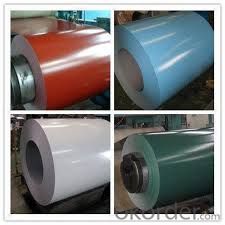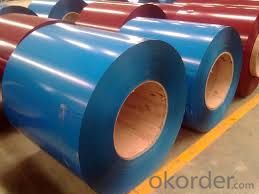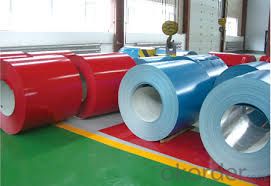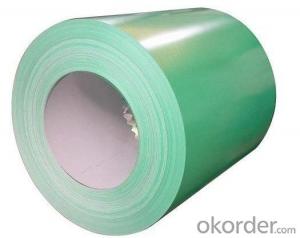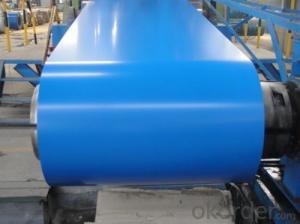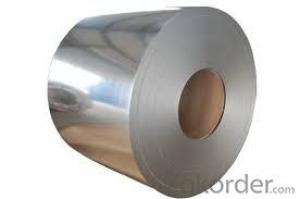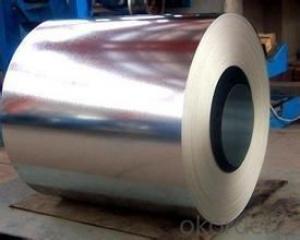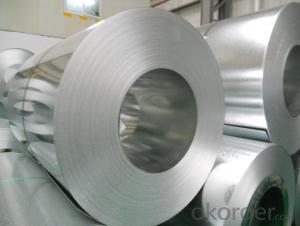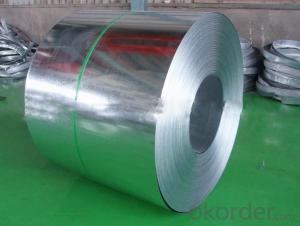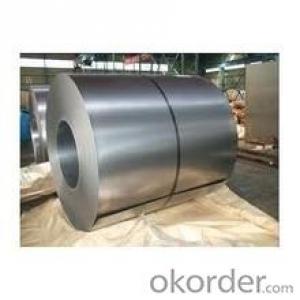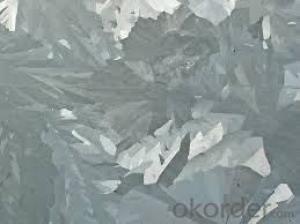Hot Dipped Galvanized Steel Coil/Hot-Dip Aluzinc Steel/Hot-dip Galvanized Steel
- Loading Port:
- Shanghai
- Payment Terms:
- TT OR LC
- Min Order Qty:
- 25 m.t.
- Supply Capability:
- 9000 m.t./month
OKorder Service Pledge
OKorder Financial Service
You Might Also Like
Product Description
1. Galvanized steel coil simple introduction:
Galvanized steel coil means that steel coils has gone through a chemical process
To keep it from corroding, so this protective metal, zinc layers, does not get rusty as easily. The coating also gives the steel a more durable, hard to scratch finish.
(1)Thickness:0.14-1.2mm
(2)Width:600-1250mm
(3)Material:SGCC,DX51D,S350GD,SPCC,CGCC
(4)Zn:40-275gsm
(5)Surface:oiled,chromated
(6)Application: Corrugated,Wall,Roofing,Structure and so on
2. Galvanized steel coil technical processing:
1)Uncoiled and sheared
2)Cleaned using a caustic solution, which can remove oil/grease, dirt, and paint
3)Entry looper to revised and then annealing furnace
4)Steel is dipped into the molten zinc bath
5)Cooled in a quench tank to reduce its temperature
6)Post treatment and crimper
3. Galvanized steel coil quality control:
Strict procurement process---skillful technical workers---final products inspection
(resistance to corrosion, salt spray test, exposure test, machinability, thermal resistance)
---standard packing
4. Galvanized steel coil advantages:
1)Zinc coating has good adhesion
2)Resistant to corrosive factors
3)High strength&quality
4)Strict quality control system
5)Standard export sea-worthy packing
5. Why choose us?
1).Advantages: We have two production line of PPGI and two lines for the galvanized steel coil, total yearly output is about 500000mt Also we have 56 professional salesperson from three international sales department, a group of technical engineers
And skillful quality control inspector.
2). Special technology support: We have two production line of pre-painted steel coil
And two lines for the galvanized steel coil, total yearly output is about 500000mt. In
Order to meet our customers new requirements, We also can manufacture the special
Products, such as Printed, Filmed, Pressed, Matte steel coil and the full hard G550
Galvanized steel and galvalume steel.
3). Conform the international quality standard: All products for export, according to the
International quality standard of Europe, Japan, Russia and America to produce.
Item: | Galvanized Steel Coils |
Material: | SGCC, SGCH, SPCC, SGCD, DX51D+Z, STO2Z,DX54D,DX51D |
Thickness: | 0.14mm-1.2mm |
Width: | 762-1250mm |
Length: | Coiled or as requested |
Surface: | Galvanized,oiled,chromated |
Application: | Industrial panels, roofing and siding for painting |
Types: | Commercial / Drawing / Deep Drawing / Structural quality |
Zinc coating: | Z40-275g/m2 |
Surface Treatment: | chromed / skinpass/ oiled/slightly oiled/ dry/ anti-fingerprint |
Surface Structure: | zero spangle / minimized spangle / regular spangle/ big spangle |
Coil Weight: | 3-10 ton per coil |
Payment term: | T/T,L/C |
Packing information: | Export standard package :bundled wooden box or be required; The inner size of container is below: 20 ft GP:5.8m(length)x 2.13m(width)x 2.18m(high) about 24-26 CBM 40 ft GP:11.8m(length)x 2.13m(width)x 2.72m(high)about 68 CBM |
Port: | Qingdao,Tianjin port |
Delivery time: | 15-20 days,after we received your deposit |
- Q: How are steel coils used in the production of infrastructure materials?
- The durability, versatility, and strength of steel coils make them widely used in the production of infrastructure materials. Typically, these coils are made from hot-rolled steel, forming large rolls or coils that are easily transported and handled. One common application of steel coils in infrastructure materials involves producing steel sheets and plates. These coils can be further processed to create flat sheets of steel, which are then utilized in various construction purposes. For instance, steel sheets are frequently employed in manufacturing bridges, highways, and buildings due to their ability to withstand heavy loads and adverse weather conditions. Another important use of steel coils in infrastructure materials is manufacturing pipes and tubes. Steel coils are often processed into seamless or welded pipes that find usage in water and gas pipelines, as well as the transportation of liquids and gases. Infrastructure projects prefer steel pipes and tubes due to their high strength, corrosion resistance, and ability to endure high-pressure environments. Moreover, steel coils are also employed in the production of reinforcing bars or rebars, crucial components in the construction of reinforced concrete structures. These rebars, made from coiled steel, are embedded within concrete to provide tensile strength and enhance the structural integrity of buildings, bridges, and other infrastructure projects. Steel coils enable efficient production of rebars, ensuring consistent quality and size for reinforced concrete constructions. In conclusion, the use of steel coils is essential in the production of infrastructure materials. Their contribution to manufacturing steel sheets, pipes, and rebars ensures the durability, strength, and reliability of infrastructure projects. By providing a versatile and robust material, steel coils contribute to the development of safe and long-lasting structures in our built environment.
- Q: How do steel coils contribute to the manufacturing of household appliances?
- Household appliances rely heavily on steel coils, which are essential for their production. These coils, crafted from high-quality steel, are vital in providing the necessary strength and durability needed for manufacturing various appliances. One key application of steel coils in household appliances is their use in constructing the appliance's body or frame. These coils are shaped and molded into the desired structure, creating a robust foundation for the appliance. This ensures that the appliance can endure daily usage and remain intact for an extended period of time. Furthermore, steel coils are also employed in manufacturing different components within household appliances. For instance, refrigerators and air conditioners utilize steel coils in their condenser and evaporator coils, which are responsible for the heat exchange process. These coils enable efficient cooling or heating, guaranteeing optimal performance of the appliance. Moreover, steel coils find application in producing appliance interiors, such as oven racks, dishwasher baskets, and laundry machine drums. The strength and resistance provided by the steel coils help these components withstand heavy loads and repeated use, enhancing the overall longevity and reliability of the appliance. Additionally, steel coils contribute to the aesthetic appeal of household appliances. They can be shaped, molded, and coated to achieve various finishes, colors, and textures, enhancing the visual attractiveness of the appliance and making it more appealing to consumers. In conclusion, steel coils are indispensable in the manufacturing of household appliances as they provide strength, durability, and resilience to the structure, components, and interiors of these appliances. They play a crucial role in ensuring the performance, reliability, and longevity of these appliances, making them an integral part of the manufacturing process.
- Q: What are the different types of steel coil edge conditioning methods?
- There are several different types of steel coil edge conditioning methods, including slitting, cutting, shearing, and edge rolling. Slitting involves cutting the coil into narrower strips, while cutting involves separating the coil into smaller sections. Shearing is a process of cutting the edges of the coil to remove any irregularities or defects. Edge rolling is a method that involves rolling the edges of the coil to create a smoother and more uniform finish.
- Q: How long do steel coils last?
- The lifespan of steel coils can vary depending on several factors, including usage, maintenance, and environmental conditions. However, with proper care and regular maintenance, steel coils can typically last for several decades.
- Q: How are steel coils used in the production of HVAC ducts?
- HVAC duct production relies heavily on steel coils, which are vital for their construction. These coils, typically composed of galvanized steel, possess the qualities of strength, durability, and corrosion resistance. To create the necessary flat sheets, the steel coils undergo an initial unwinding and flattening process. These sheets are then cut into specific sizes and shapes in accordance with the design and dimensions of the HVAC ducts. Additionally, the steel coils are subjected to various machines, such as shearing, slitting, and roll forming machines, to achieve the desired shapes and sizes for the ducts. Once transformed into the appropriate shapes, the steel coils are further processed to add additional features to the ducts. This can include bending, folding, or welding processes to create bends, angles, or connections in the ductwork. These processes allow for customization, ensuring that the ducts perfectly fit the specific requirements of the HVAC system and the building structure. Moreover, steel coils play a crucial role in maintaining the strength and integrity of HVAC ducts. The galvanized steel used in the coils provides a protective layer that prevents rust and corrosion, resulting in more durable and long-lasting ducts. This is particularly significant as HVAC ducts are regularly exposed to various environmental factors such as moisture, temperature changes, and airborne contaminants. In summary, steel coils are an essential and fundamental component in the production of HVAC ducts. They not only provide the necessary strength, durability, and corrosion resistance but also offer flexibility and customization in the manufacturing process.
- Q: What are the common surface defects in steel coils?
- Steel coils commonly have surface defects, including scratches, pits, indentations, stains, and rust spots. Scratches may occur due to mishandling or processing, and their depth and length can vary. Pits are small depressions caused by impurities in the steel or during manufacturing. Indentations are similar but larger and more noticeable. Stains can result from chemicals, water, or other contaminants coming into contact with the steel. Rust spots form when the steel is exposed to moisture or corrosive elements, leading to iron oxide formation. These defects can impact the appearance, quality, and performance of the steel, necessitating their resolution to ensure the intended use of the coils.
- Q: What is the standard thickness of steel coils?
- The standard thickness of steel coils can vary depending on the specific application and industry requirements. However, in general, steel coils are typically available in a range of thicknesses between 0.5mm to 10mm. The desired thickness of a steel coil is determined by factors such as the intended use, structural requirements, and manufacturing processes. Thicker steel coils are often used for heavy-duty applications that require greater strength and durability, while thinner coils are suitable for lighter applications where flexibility and weight reduction are important. It is important to consult industry standards and specific project requirements to determine the appropriate thickness for steel coils in any given application.
- Q: How does the steel coil market vary regionally?
- The steel coil market varies regionally due to several factors such as the level of industrialization, economic development, and the specific demands and requirements of each region. In developed regions such as North America and Europe, the steel coil market is relatively mature and highly competitive. These regions have well-established manufacturing industries and infrastructure, which create a strong demand for steel coils for various applications such as automotive, construction, and machinery. The market in these regions is driven by factors like technological advancements, product innovation, and the need for high-quality materials. On the other hand, developing regions such as Asia-Pacific, Latin America, and Middle East & Africa experience rapid industrialization and urbanization, driving the demand for steel coils. These regions have growing construction sectors, booming automotive industries, and increasing infrastructure projects, which contribute to the rising demand for steel coils. Additionally, the availability of low-cost labor and raw materials in some of these regions makes them attractive for steel coil production. Furthermore, the regional variations in regulations and trade policies also impact the steel coil market. Tariffs, import/export restrictions, and government initiatives to promote domestic production can affect the market dynamics. For instance, protectionist measures like trade barriers or anti-dumping policies can limit the import of steel coils, leading to increased domestic production and regional market growth. Moreover, geographical factors and climate conditions can also influence regional steel coil markets. Coastal regions with high humidity levels and exposure to saltwater require specialized corrosion-resistant steel coils, while inland regions with extreme temperatures may demand coils with specific mechanical properties to withstand such conditions. Overall, the steel coil market varies regionally due to differences in industrialization, economic factors, specific demands, regulations, and geographical considerations. Understanding these variations is crucial for steel coil manufacturers, suppliers, and consumers to effectively navigate the market and capitalize on the opportunities available in each region.
- Q: How are steel coils used in the manufacturing of electrical enclosures?
- Steel coils are used in the manufacturing of electrical enclosures as they provide the raw material for forming the enclosures' outer shells and structural components. The steel coils are processed and shaped through various techniques such as cutting, bending, and welding, to create the desired size and shape of the enclosure. The steel's strength and durability make it an ideal material choice for ensuring the enclosures can protect electrical equipment from environmental factors and provide safety for users.
- Q: How are steel coils coated to prevent rust and corrosion?
- Steel coils are coated to prevent rust and corrosion through a process called galvanization, wherein a layer of zinc is applied to the surface. This zinc layer acts as a sacrificial barrier, protecting the steel from exposure to moisture and oxygen, thereby preventing rust and corrosion.
Send your message to us
Hot Dipped Galvanized Steel Coil/Hot-Dip Aluzinc Steel/Hot-dip Galvanized Steel
- Loading Port:
- Shanghai
- Payment Terms:
- TT OR LC
- Min Order Qty:
- 25 m.t.
- Supply Capability:
- 9000 m.t./month
OKorder Service Pledge
OKorder Financial Service
Similar products
Hot products
Hot Searches
Related keywords
